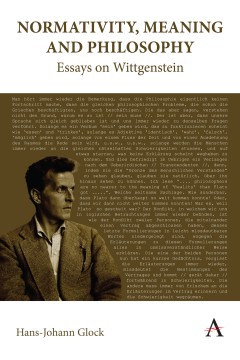Normativity, Meaning and Philosophy: Essays on Wittgenstein
By Hans-Johann Glock
Other Formats Available:
E-Book- About This Book
- Reviews
- Author Information
- Series
- Table of Contents
- Links
- Podcasts
About This Book
This is a collection of essays on Wittgenstein and Wittgensteinian themes that appeared between 1996 and 2019. It is divided into three parts, with a common trajectory laid out in a substantial introduction. The first part links meaning, necessity and normativity. It defends and modifies Wittgenstein’s claim that the idea of a ‘grammatical rule’ holds the key to understanding linguistic meaning and its connection to necessary propositions. The second part elucidates the connections between meaning, concepts and thought in Wittgenstein and beyond. It shows how he laid the grounds for a sound understanding of four contested issues—radical interpretation, concepts, nonsense and the scope and limits of animal thought. The third part provides a qualified defence of Wittgenstein’s influential yet extremely controversial idea that philosophical problems are conceptual, and thereby rooted in confusions concerning the meanings of and semantic relations between linguistic expressions. Against irrationalist interpretations, Glock demonstrates that Wittgenstein’s method is argumentative rather than therapeutic.
The essays reconstruct Wittgenstein’s writings in a way that identifies the often cryptic problems and arguments in his work. This sets them apart from a currently popular trend of therapeutic interpretations, as in the ‘New Wittgenstein’ school. By contrast to other critics of such interpretations, Glock acknowledges that they are to a limited extent warranted by some aspects of Wittgenstein’s work, e.g. concerning the notion of nonsense or what he calls ‘the myth of mere method’. At the same time the essays convincingly criticize these aspects and show that they are not presupposed by the more important lessons that Wittgenstein still has to teach.
The collection brings out the abiding relevance of Wittgenstein’s reflections to contemporary debates on central themes such as the importance of normativity, the foundations of meaning and necessity, the nature of concepts, the possibility of animal thought and the proper method of philosophy.
Reviews
“This is an outstanding collection of Glock’s essays on Wittgenstein. They are written with exemplary clarity and methodological self-consciousness, illuminating major themes in Wittgenstein’s philosophy and highlighting difficulties. This volume constitutes a permanent and invaluable contribution to both analytic philosophy and Wittgenstein studies.”—P. M. S. Hacker, St John’s College, Oxford, UK.
“I can’t think of anyone who has contributed more to our understanding of Wittgenstein’s philosophy than Hanjo Glock. Although I’m greatly looking forward to reengaging with this collection of his essays, I don’t need to do that in order to be confident of the education and pleasure I will receive from it, and I can already recommend, in the strongest possible terms, that any philosopher should study it very carefully.” —Paul Horwich, New York University, USA.
“The very well-argued and enjoyable essays in this collection present some of the most important highlights of Glock’s take on Wittgenstein’s philosophy. His approach is always balanced, supremely well informed, and continues successfully to present Wittgenstein’s work as of central and enduring importance to modern philosophy.”—John Preston, University of Reading, UK.
Author Information
Dr. Hans-Johann Glock is a professor of philosophy at the University of Zurich (Switzerland), a Senior Advisor at the National Centre of Competence in Research 'Evolving Language' of the Swiss National Science Foundation and a recipient of a Humboldt Research Prize.
Series
Anthem Studies in Wittgenstein
Table of Contents
Acknowledgements; Part I Norms and Necessity, Chapter 1 Necessity and Normativity; Chapter 2 Necessity and Language: In Defence of Conventionalism; Chapter 3 Does Language Require Conventions?; Chapter 4 Philosophy Rehinged?; Part II Thought and Concepts, Chapter 5 On Safari with Wittgenstein, Quine and Davidson ; Chapter 6 All Kinds of Nonsense; Chapter 7 Wittgenstein on Concepts; Chapter 8 Thought, Language and Animals; Part III Meaning and Philosophy, Chapter 9 What Is Meaning? A Wittgensteinian Answer to an Un-Wittgensteinian Question; Chapter 10 Philosophical Investigations Section 128: ‘Theses in Philosophy’ and Undogmatic Procedure; Chapter 11 Philosophy and Philosophical Method; Chapter 12 Unruly Wittgensteinians; Bibliography; Index of Names and Subjects
Links
Stay Updated
Information
Latest Tweets



